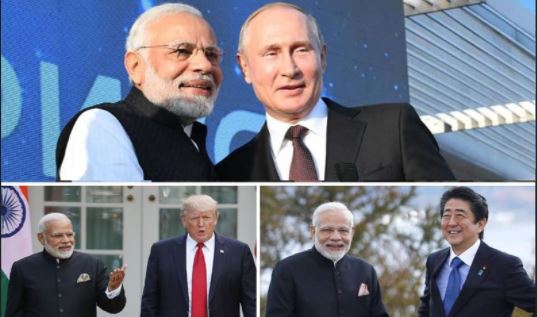As we at TFI had predicted a couple of months ago, Russia is riding on India’s goodwill to get mainstreamed in the existing world order. First, the US and now the US ally Japan, the democratic world is showing signs of greater acceptance for Moscow, which was once clubbed together with Beijing or even seen as a bigger threat than the paper dragon.
In fact, as China emerges as the number one enemy of the entire world, India is helping Russia unite with the countries that had once snubbed Moscow. Case in point being Japan, which is reportedly ready to join a trilateral mechanism along with India and Russia. The trilateral initiative is expected to cause rapprochement in Japanese-Russian relations, a departure from the Cold War era legacy and the decades old Kuril Islands dispute.
The Kuril Islands dispute is at the root of cold relations between Japan and Russia. The subject of the dispute are four islands- Kunashir (known in Japanese as Kunashiri), Iturup (Etorofu), Shikotan and the rocky Habomai islets.
Russia calls the disputed islands Southern Kurils and Japan calls them Northern Territories. In 1855, Russia and Japan signed the Treaty of Shimoda, which gave Japan the ownership of the four Southern Islands and Russia ownership of the rest of the Island chain in the North.
However, things changed after the Second World War as Russia took control of the four Southern Islands and started administering them. The 17,000 Japanese residents on these Islands were dismissed to Japan by 1949. Since then relations between Japan and Russia (or the erstwhile USSR) have been marred by the territorial dispute.
And then Japan became a US ally in the post-Second World War era. This was the time of a lengthy Cold War between the US and its allies on one side, and the USSR and its allies on the other side. Even after the disintegration of the Soviet Union, the legacy of the Cold War was carried forward and Japan did not try to forge closer ties with Russia.
But times have changed now. China is the biggest threat for the free world today. The Communist-Authoritarian State of China is eight times bigger an economy than Russia. Also, Beijing is in many ways more hawkish and belligerent than Moscow. It is easier to negotiate with Moscow than Beijing.
As we at TFI have emphasised several times, clubbing Russia and China makes China stronger. Also, Russia is no friend of China. It despises China even more than the democratic world, because Russia’s own territorial and prestige disputes with China tend to be as acrimonious as say the Japan-China Senkakus dispute. A common enemy in China therefore implies that the Russia-Japan territorial disputes take a backseat.
The question that however intrigues the democratic world was who would unite Moscow with Japan or any other free world country for that matter. India seems to have an answer.
The Trilateral Track-2 as the proposal of India-Japan-Russia Trilateral is being called would bring the three countries together for joint investments and projects. With this initiative, Russia also gets to prove that it has a stake in the Indo-Pacific Initiative to contain China even though the official line in Moscow is to dismiss the Indo-Pacific as exclusionary and use the term ‘Asia-Pacific’ insead.
The manner in which India is uniting Moscow and Tokyo is also an example of New Delhi’s diplomatic heft. The mainstream media keeps telling you that India faces an unwanted situation of Russia as an ally on one side, and the democratic world as an ally on the other. But the reality is that New Delhi’s approach is to use this an opportunity, especially given the fault-lines in the Sino-Russian partnership.
Japan-Russia rapprochement is thus another major setback coming China’s way through New Delhi.
